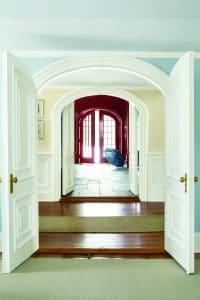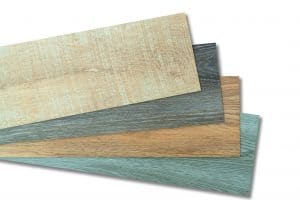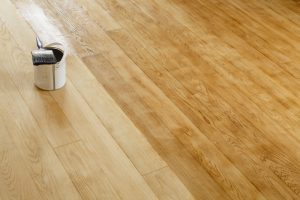If you are in the market for a floor with the look and feel of hardwoods, then there are really two choices: hardwood and engineered wood. While both floors have a wood surface, they are not the same and deciding which one you want for your new floors may depend on your budget, your expectations, and the wear-and-tear you expect for your floors.
What Is Hardwood?
A hardwood floor, also known as solid wood flooring, is made of solid wood through its entire thickness. Hardwood floors can be finished or unfinished.
What Is Engineered Wood?
Engineered wood has a layer of hardwood, which is bonded over plywood.
How Are They Installed?
Hardwood flooring is milled with interlocking tongues and grooves and then nailed down to the subfloor. Engineered wood floors can be installed in a variety of ways including being nailed down, glued, or even floating floors.
Can You DIY Install Them?
Yes, but nailing down hardwood floors takes some skill. Installing a floating floor is easier for a DIY project, making engineered wood the better choice for a DIY project.
Which One Has More Variety?
You can get hardwood floors in almost any type of wood, with a huge variety of stains, or even unfinished to stain it yourself, making hardwood floors the clear winner if you are looking for variety.
Which One Lasts Longer?
This seems like a simple question, but it is not. Hardwood floors can theoretically last forever, but they are susceptible to moisture damage. Engineered floors can have an equivalent wear layer and can last as long as solid wood.
Can You Refinish Them?
You should be able to refinish both engineered and solid hardwood floors based on the thickness of the wear layer. However, the thin layer on engineered floors means that they can usually not be refinished multiple times. You can refinish hardwood floors two or three times and possibly even more than that, depending on the thickness of the planks.
Which One Looks Better?
This is generally a matter of personal preference. Hardwood floors tend to have narrower planks and a tighter fit, while engineered floors have wider planks and may have a built-in gap between planks because of the bevel on the edge. Both look fabulous.
Which One Has Better Moisture Resistance?
Neither are great for moisture resistance, as they are both composed of wood and prone to warping, so they should not be used in bathrooms, kitchens, or other wet locations. However, engineered wood flooring can be installed against concrete slabs and in humid locations.
Which One Is Easier to Clean?
This is another tie. Routine cleaning for both types of flooring is sweeping, vacuuming, and damp-mopping with a wood cleaner.
Which One Is More Affordable?
While there is plenty of overlap in the cost of hardwood floors and engineered wood floors, generally the engineered floors are going to be more affordable. Additionally, because installation for engineered floors is easier, it may be significantly less expensive. Per square foot, the differences may not seem huge, but it can mean tens of thousands of dollars of difference if you are replacing all the floors in your home.
Which One Improves Your Resale Value More?
Both are considered premium flooring, but solid hardwoods increase resale value more than just about any other type of flooring.




